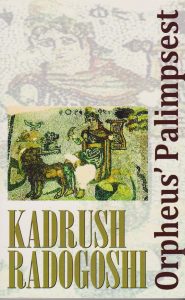Kadrush Radogoshi an Edmonton Orpheus / By Richard Davies
Kadrush Radogoshi is an established Albanian poet whose latest book, Orpheus’ Palimpsest, is inspired by the story of Orpheus and Eurydice, one of the central myths of Western civilization. The romantic poems in this unified collection are connected by the author’s preoccupation with seeing and poetic vision. For him, though, language is the way to beauty; as he puts it, “The word has a beautiful eye”. Indeed, the eye per se is the musical instrument the poet recurrently ‘plays on’ in order to describe and elaborate the many moods and moments of poetic inspiration. This is, in turn, reflected in many key poem titles such as “Orpheus’ Essay on Eyes”.
The music and musical themes of the poems also become the underlying argument of the author’s thesis; as he says, “The only proof/About the beauty of the song”. Radogoshi aims for beauty as relief from the ugliness and conflicts of the real world which backgrounds and underlies this particular poetic quest. He desires the fresh start of another book, another working ‘paper’ or palimpsest–to transcend that real world via hymns to the possibilities of love and beauty. And thus, the resonances of the old classical myth are recreated in his this poetic journey and the poet’s own soul.
The poet takes the reader to “a romantic corner on the horizon/Beyond bars, beyond wires” of that real world–transcending the limits of hate, political repression, and violence he once himself survived in (specifically, in Kosovo) before coming to Canada to begin a new freer life, reflected in the principal quest of this important collection. He chooses to express “The blossomed rose in the exotic garden of vision” in lieu of a diminished modern world where true or traditional heroes the likes of Odysseus have gone, as he says “missing”.
The poet takes the reader to “a romantic corner on the horizon/Beyond bars, beyond wires” of that real world–transcending the limits of hate, political repression, and violence he once himself survived in (specifically, in Kosovo) before coming to Canada to begin a new freer life, reflected in the principal quest of this important collection. He chooses to express “The blossomed rose in the exotic garden of vision” in lieu of a diminished modern world where true or traditional heroes the likes of Odysseus have gone, as he says “missing”.
The soul of the poet, his adopted Orpheus persona, looks to and for Eurydice who symbolizes, variously, his missing self/elusive ideal love/desired woman as well as the source of poetic inspiration in his life and for this particular project. Along the way, he seeks the courage, persistence, patience, and strength, and hope to pursue her and the special unique vision he is passionately articulating throughout this book. But always, the book returns to the “myth egg” or source of traditional poetic inspiration–the possible models and timeless possibilities that Orpheus and Eurydice still offer people, lovers, and writers alike today. Always too, there is the recurring theme of remaking or idealized transfiguration as symbolized by this key line: “You turn into a Star”.
I should also mention Radogoshi’s skillful use of water and fire imagery to complete the desired ritualistic cleansing and transformational powers of love, again reflected in such pieces as “When I Used to Wash Your Ardent Eyes with Dew” and “The Sacred Fire”. As the latter title suggests, all the associated sanctity and holiness of platonic love at work and play here. The way into a life of stars, though, is chiefly through the ‘Gaze’–the beholding of the idealized love of Eurydice: “a love coming out of legend”.
Make no mistake, Orpheus’ Palimpsest is very much also the plight and quest of the average modern Western person alienated from the best and most beautiful aspects of the old Western civilization, especially its lofty views of love, art, and beauty. Radogoshi’s journey is also personally his own, ending with the poem: “Orpheus’ Last Journey”, itself a mirror of the poet’s transition to Canada and his new still-in-process freer life contrasted with his conflictful past, as well as his recent writings in English which now include this book.
And though this variation of the Orpheus-Eurydice theme has come to an end with a large concluding vision and Radogoshi himself has physically and innerly arrived elsewhere, he has long been and continues to be a significant, inspired poet, similar to Orpheus, who learned his unique aesthetic ‘chops’ from his formative past experience: “The existential geometry/Is easily learnt from the plane/But not its esthetics”.

